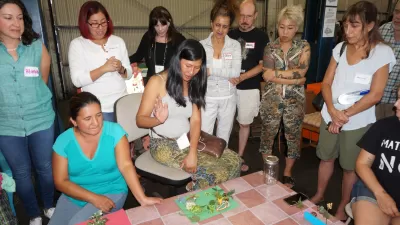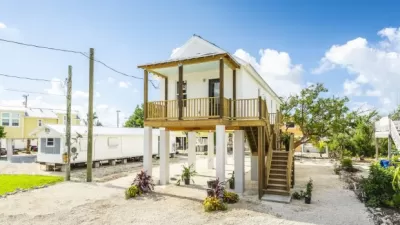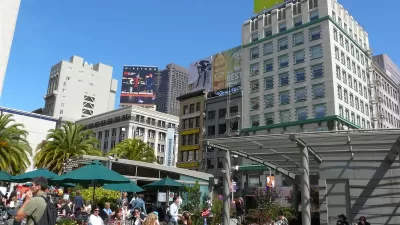A growing movement to create community-owned commercial spaces could shift power away from institutional landlords.

A community ownership model for commercial real estate could provide a way for neighborhoods to take control of local development and put resources back into the community rather than into the pockets of absentee landlords or investment corporations. Writing in Next City, Oscar Perry Abello describes the movement to put real estate ownership in community hands.
“In Alaska’s largest city, the Anchorage Community Land Trust acquired nine properties over the course of 2005-2011, using all private funding. The properties now house space for seven nonprofit organizations; a building that houses the CLT’s office and a training center and art studios for Alaska Native and American Indian artists; a restaurant; a credit union; and also the 28,000 square-foot Grow North Farm and farmer’s market.” In Philadelphia, “The Kensington Corridor Trust is one of several community-owned or community-led commercial real estate entities at various stages of formation and implementation across the country, and they’re starting to get more notice.”
“Ownership over commercial corridors is an important factor for the development of neighborhoods, but it hasn’t been the focus of as much policy as affordable housing or homeownership. Due to historic – and ongoing – barriers in access to credit or opportunities in commercial real estate, it’s common for commercial corridors in Black or Latino neighborhoods to remain in the hands of property owners who no longer live in those neighborhoods, if they ever did.”
According to a Brookings report, just 3 percent of Black households own commercial real estate, with an average value of $3,600 as compared to 8 percent and $34,000 for white households. Proponents of community ownership say it allows residents to determine how properties will be used and ensure that tenant businesses serve local needs.
FULL STORY: Community-Owned Commercial Real Estate Is Having A Moment

Alabama: Trump Terminates Settlements for Black Communities Harmed By Raw Sewage
Trump deemed the landmark civil rights agreement “illegal DEI and environmental justice policy.”

Study: Maui’s Plan to Convert Vacation Rentals to Long-Term Housing Could Cause Nearly $1 Billion Economic Loss
The plan would reduce visitor accommodation by 25% resulting in 1,900 jobs lost.

Planetizen Federal Action Tracker
A weekly monitor of how Trump’s orders and actions are impacting planners and planning in America.

Waymo Gets Permission to Map SF’s Market Street
If allowed to operate on the traffic-restricted street, Waymo’s autonomous taxis would have a leg up over ride-hailing competitors — and counter the city’s efforts to grow bike and pedestrian on the thoroughfare.

Parklet Symposium Highlights the Success of Shared Spaces
Parklets got a boost during the Covid-19 pandemic, when the concept was translated to outdoor dining programs that offered restaurants a lifeline during the shutdown.

Federal Homelessness Agency Places Entire Staff on Leave
The U.S. Interagency Council on Homelessness is the only federal agency dedicated to preventing and ending homelessness.
Urban Design for Planners 1: Software Tools
This six-course series explores essential urban design concepts using open source software and equips planners with the tools they need to participate fully in the urban design process.
Planning for Universal Design
Learn the tools for implementing Universal Design in planning regulations.
Caltrans
Smith Gee Studio
Institute for Housing and Urban Development Studies (IHS)
City of Grandview
Harvard GSD Executive Education
Toledo-Lucas County Plan Commissions
Salt Lake City
NYU Wagner Graduate School of Public Service





























